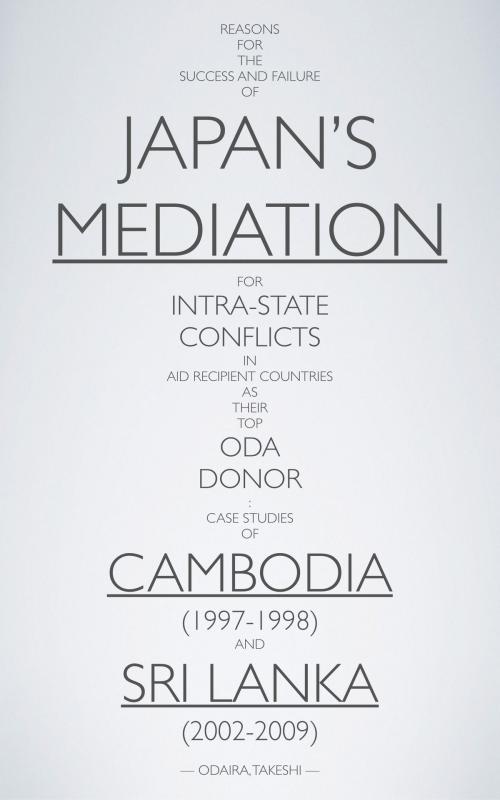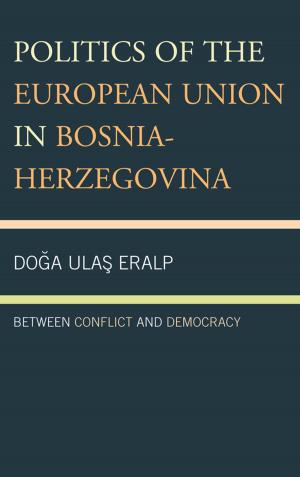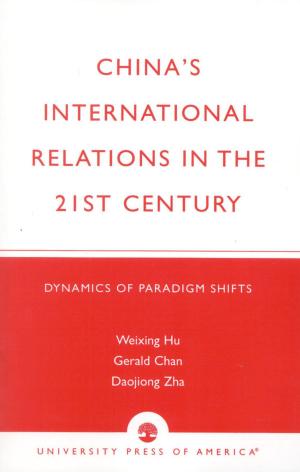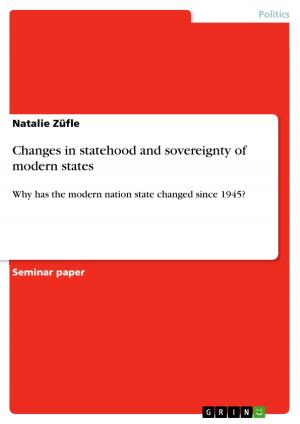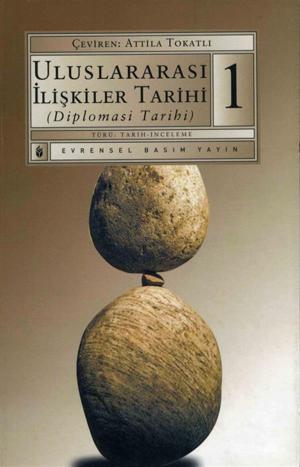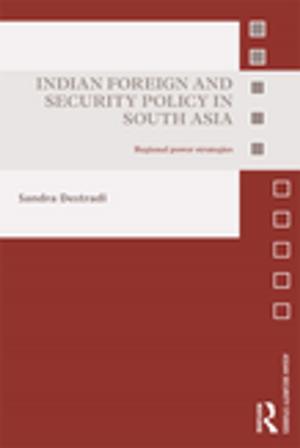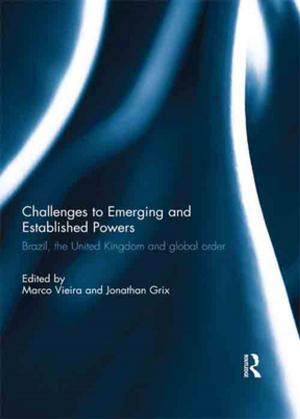Reasons for the Success and Failure of Japan’s Mediation for Intra-State Conflicts in Aid Recipient Countries as Their Top ODA Donor
Case Studies of Cambodia (1997-1998) and Sri Lanka (2002-2009)
Nonfiction, History, Asian, Asia, Japan, Social & Cultural Studies, Political Science, International, International Relations| Author: | ODAIRA, Takeshi, 大平剛史 | ISBN: | 1230000523547 |
| Publisher: | ODAIRA, Takeshi | Publication: | July 1, 2015 |
| Imprint: | Language: | English |
| Author: | ODAIRA, Takeshi, 大平剛史 |
| ISBN: | 1230000523547 |
| Publisher: | ODAIRA, Takeshi |
| Publication: | July 1, 2015 |
| Imprint: | |
| Language: | English |
Why was Japan able to successfully mediate an intra-State conflict only in Cambodia from 1997 to 1998 and not in Sri Lanka from 2002 to 2009 as their top ODA donor that had been expected to have much influence on these aid recipient countries and thus was highly motivated to mediate efficiently by using its aid?
The existing literature cannot explain these contrasting results. This is because the systematic knowledge on the impact of ODA on the mediation outcome and its mechanism is missing in the literature. Firstly, they do not discuss why donors acting as mediators often fail. Secondly, the previous studies on Japan’s mediation in Cambodia and Sri Lanka are scarce and omit the explanations for the detailed mechanisms of Japan's success and failure in mediation using aid. Thirdly, the literature also lacks the systematic categorization of sources of leverage of mediators based on the rigid definitions of leverage and its sources, which have prevented comparable case studies of mediation conducted by donors.
Therefore, this thesis* conducts a comparative qualitative case study of Japan's mediation in Cambodia and Sri Lanka. Primary sources of data include media reports, newly disclosed internal documents of governments, memoirs and interviews with key figures involved in mediation activities.
As the first major contribution to the existing literature, the thesis offers the new knowledge on the impact of ODA on the mediation outcome. The effective use of ODA in mediation for an intra-State conflict was characterized firstly by the suspension of aid provision and that of its contracting processes in a way that showed mediator’s determination to actually decide whether to provide aid depending on the actions of the parties in the conflict that were related to conflict resolution. It was characterized secondly by its mobilization to ensure the implementation of an agreed mediation proposal.
As the second major contribution, this thesis offers the systematic categorization of sources of leverage of mediators based on the rigid definitions of leverage and its source. As the third major contribution, this thesis reveals how Japan acted as the top donor playing a role of a mediator and the detailed mechanism of Japan's success and failure in mediation using aid in Cambodia and Sri Lanka.
It was revealed that Japan succeeded only in Cambodia firstly because it was less difficult to mediate due to their different contexts including China’s different support to the parties in the conflict and styles of mediation. It was secondly because Japan used aid more effectively in mediation in collaboration with other mediators using both tangible and intangible sources of leverage under more favorable circumstances.
By comparing the two conflicts, the research also evaluated the utility of ODA in mediation and revealed that it has a positive impact on mediation, especially with BF under PFC, if utilized well as a leverage source on the condition of well-designed aid sanctions, in the way as explained in the first major contribution. Moreover, Strength and weakness of aid as a source of leverage were also revealed.
As for the structure of the thesis, following the introductory chapter (Chapter 1), Chapters 2 and 3 explain about successful and unsuccessful cases of Japan's mediation in Cambodia and Sri Lanka and reasons for different results. The subsequent Chapter 4 compares the two cases and discusses major reasons for the contrasting results of mediation. Finally, the concluding chapter (Chapter 5) summarizes major findings, contributions to the existing literature and limitations of this thesis, and its implications to future researches.
*This book is based on a Doctoral Thesis for the author's Doctor of Philosophy (PhD) degree in International Studies, officially submitted in February 2015 to Graduate School of Asia-Pacific Studies (GSAPS), Waseda University.
Why was Japan able to successfully mediate an intra-State conflict only in Cambodia from 1997 to 1998 and not in Sri Lanka from 2002 to 2009 as their top ODA donor that had been expected to have much influence on these aid recipient countries and thus was highly motivated to mediate efficiently by using its aid?
The existing literature cannot explain these contrasting results. This is because the systematic knowledge on the impact of ODA on the mediation outcome and its mechanism is missing in the literature. Firstly, they do not discuss why donors acting as mediators often fail. Secondly, the previous studies on Japan’s mediation in Cambodia and Sri Lanka are scarce and omit the explanations for the detailed mechanisms of Japan's success and failure in mediation using aid. Thirdly, the literature also lacks the systematic categorization of sources of leverage of mediators based on the rigid definitions of leverage and its sources, which have prevented comparable case studies of mediation conducted by donors.
Therefore, this thesis* conducts a comparative qualitative case study of Japan's mediation in Cambodia and Sri Lanka. Primary sources of data include media reports, newly disclosed internal documents of governments, memoirs and interviews with key figures involved in mediation activities.
As the first major contribution to the existing literature, the thesis offers the new knowledge on the impact of ODA on the mediation outcome. The effective use of ODA in mediation for an intra-State conflict was characterized firstly by the suspension of aid provision and that of its contracting processes in a way that showed mediator’s determination to actually decide whether to provide aid depending on the actions of the parties in the conflict that were related to conflict resolution. It was characterized secondly by its mobilization to ensure the implementation of an agreed mediation proposal.
As the second major contribution, this thesis offers the systematic categorization of sources of leverage of mediators based on the rigid definitions of leverage and its source. As the third major contribution, this thesis reveals how Japan acted as the top donor playing a role of a mediator and the detailed mechanism of Japan's success and failure in mediation using aid in Cambodia and Sri Lanka.
It was revealed that Japan succeeded only in Cambodia firstly because it was less difficult to mediate due to their different contexts including China’s different support to the parties in the conflict and styles of mediation. It was secondly because Japan used aid more effectively in mediation in collaboration with other mediators using both tangible and intangible sources of leverage under more favorable circumstances.
By comparing the two conflicts, the research also evaluated the utility of ODA in mediation and revealed that it has a positive impact on mediation, especially with BF under PFC, if utilized well as a leverage source on the condition of well-designed aid sanctions, in the way as explained in the first major contribution. Moreover, Strength and weakness of aid as a source of leverage were also revealed.
As for the structure of the thesis, following the introductory chapter (Chapter 1), Chapters 2 and 3 explain about successful and unsuccessful cases of Japan's mediation in Cambodia and Sri Lanka and reasons for different results. The subsequent Chapter 4 compares the two cases and discusses major reasons for the contrasting results of mediation. Finally, the concluding chapter (Chapter 5) summarizes major findings, contributions to the existing literature and limitations of this thesis, and its implications to future researches.
*This book is based on a Doctoral Thesis for the author's Doctor of Philosophy (PhD) degree in International Studies, officially submitted in February 2015 to Graduate School of Asia-Pacific Studies (GSAPS), Waseda University.
